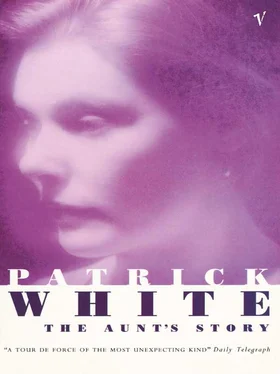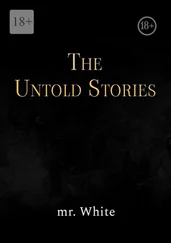Violet looked at Theodora, through the hymn, over the heads of Grace and Lottie. She smiled the mysterious smile of someone who reads poetry and shares secrets, and Theodora smiled also, because it was true, but that was not all.
Waiting for the hymn to stop, and the voices of girls that praised the Lord in pink and blue, she watched the light blaze through the glass Dragon and gild the nape of Frank Parrott’s neck, which was already gold. He sat ahead, a reddish gold.
Afterwards everyone stood about outside the church, and families picked out their own girls, to talk or to take to dinner. The girls were suddenly sheepish then, to find their lives divided into two.
‘You should ask your Violet Adams out to Meroã,’ said Mother, waiting for Father to bring round the horses from where they had been nosing chaff behind the church.
‘Not today,’ Theodora shrugged.
Because she did not feel there was much connection between Violet Adams and Meroã. She looked at Violet, who was talking hard to Una Russell and pretending not to see. There was no connection at all.
‘No,’ Theodora said. ‘Another time.’
And she stepped back, bumping, with a thump that was heard, the hard body of Frank Parrott.
‘Hello, Theo,’ laughed Frank. ‘It’s a long time. You must get Grace to bring you over. You and Fanny. We must have a picnic.’
Frank, who had harnessed the horses to the sociable the Parrotts used for church, spoke and looked aside. Frank was uneasy in his Sunday clothes, but still a transparent gold that Sunday had not touched. Theodora wanted and wanted not to look. She remembered a red and clumsy boy, and a wart on a hard knee. Now Frank was fine and straight in his wrinkled Sunday pants, and what there was of his moustache was gold.
‘That would be nice. Yes, Frank. We shall speak with Grace,’ Theodora said.
Then backed, to escape any possibility of further encounter with Frank Parrott, whose Adam’s-apple moved up and down. At the same time she had the impulse to give to someone something, whereas there was nothing, only her hymn book that she held too tightly in her glove. She could not feel her hand.
When Theodora returned, her face still bright, when it was evening, Violet’s skin was thick and pale.
‘Well,’ Violet said.
‘Oh, it is you,’ said Theodora.
It was inevitable.
‘Where did you get to?’ Violet said.
‘When?’ Theodora asked. She was still dazed.
‘Why, after church,’ Violet said.
‘Nowhere. There was such a crush.’
‘I had something to tell you,’ said Violet.
‘What?’
‘Aha,’ said Violet, with a kind of pale secrecy that would not be read.
But it did not greatly matter what it was that Violet had to tell. And Violet knew. Violet was being a goose, but Theodora could have kissed her, in spite of the goosishness, and the rather shameful voice in which she had read the poem, and the steady seeping of her catarrhal nose. Theodora loved Violet dearly. She could afford to. She was strong.
Theodora waited many days for something to happen, but it did not. Often it does not happen. Theodora often looked at Grace Parrott, who was unperturbed, to see what Grace expected, but Grace did not.
So Theodora said to Grace, in tea, ‘Frank spoke about a picnic.’
‘Oh,’ said Grace, disliking a prune. ‘Frank will talk his head off.’
‘I thought,’ said Theodora, ‘we might combine. Gertie would make the cakes.’
‘But Frank,’ said Grace, ‘is going to Muswellbrook on Friday. He will work on the Thompsons’ place. For experience,’ she said.
So it was like that, as wrinkled as a prune.
‘Theodora,’ Violet Adams said, ‘I want to see you afterwards. It is most important. I have had some news.’
Violèt took Theodora into a corner of the big, dark schoolroom, not outside, which was unusual, but it was unusual news that Violet hinted at. Over the prunes she had tried to make it dark, and now to keep it so, in the deserted schoolroom, into which the light fell only a little way from the glass door, marking the boards for a space, but not the desks, these remained shapes.
Theodora felt, and would feel, blank, whatever Violet might now say. It was only a bare suggestion that Frank Parrott had made, and as a bare suggestion Grace had disposed of it. Theodora sat and waited for Violet to speak. She sat on a bench beside the big blackboard, on which there was still the figure of a problem, an isosceles triangle it was, that somebody had solved and left. It looked both frightfully simple and frightfully complex. Theodora sat. She felt the chalk dust settle on her. She waited for Violet to say something, to create a fresh figure, and present a similar problem for which a solution would have to be found. These were endless.
‘Well, won’t you guess?’ Violet asked.
‘I am going to bed soon,’ said Theodora. ‘I have a headache.’
Violet laughed. Caught in her own drama, she could not really believe in headaches. Besides, her news had given her an importance that Theodora lacked. She would speak, but the secret could never be equally theirs.
‘I am leaving at the end of the term,’ Violet said.
Theodora stirred. The blank that one gesture had rubbed was widened by Violet’s words.
‘I am going home,’ said Violet. ‘Mother considers I have had enough of school. I shall help with the housekeeping and do the flowers.’
The settled nature of it all made Violet’s voice flat and matter of fact. But of course it would happen like this. The answer could have been found at the back of the book.
‘But we shall write to each other, Theo.’
As if, perhaps, she had felt the coldness of her triumph, which now she wanted to warm. Theodora felt on her shoulder Violet’s face.
‘And I shall leave soon too,’ Theodora said.
Not that this lessened the distance. Violet was already a prisoner in a house, arranging flowers in a cut-glass bowl.
‘Will you be sorry, a little, that I am going?’ Violet asked.
She had to probe the darkness, for one or two wounds received.
‘Violet,’ said Theodora, ‘you ask me to say such difficult things.’
‘What are you two doing in here?’
It was Una Russell, peering from the doorway.
‘We were talking,’ Violet said.
‘Well I never!’ said Una Russell.
Theodora went upstairs. She undressed. She lay face down so that she would find a thicker darkness, and lose all expression in the pillow.
Theodora cried, for what she did not ask herself, but it seemed immeasurable, the slow darkness and the days which jerked past. It was as if time were a magic lantern in which it was never omitted to change the slide. So Violet Adams came downstairs in her gloves, after the concert and the cakes, and laughed, and kissed, and cried, and went. So there were berries on the hawthorn tree and frost on the rut. So the lamb was born with two heads in the hollow, and they put it in a jar, in a cupboard at Meroã, to be shown to the curious until its wonder was forgotten.
At Meroã Theodora asked, ‘When shall I be coming home?’
Father said there was no hurry, she would find, there was no hurry for anything.
‘But at Meroã I shall be free,’ Theodora said.
‘Free?’ said Father. ‘Free from what?’
Handing it back it was a plate of air.
Father’s beard smiled and said she had a lot to learn.
Theodora went out. She walked up the black hill, that winter had blackened further, the black cone of Ethiopia that had once flowed fire. Near the summit there stood a wooden house, or what remained of it, a narrow lantern that was somebody’s folly. He had lived there with his madness and his dogs until he died, and now there were tins and bones. Theodora sat on a stone which had been part of the foundations of the madman’s folly. Nobody knew what his intention had been. Only that he had built this house and lived and died.
Читать дальше












